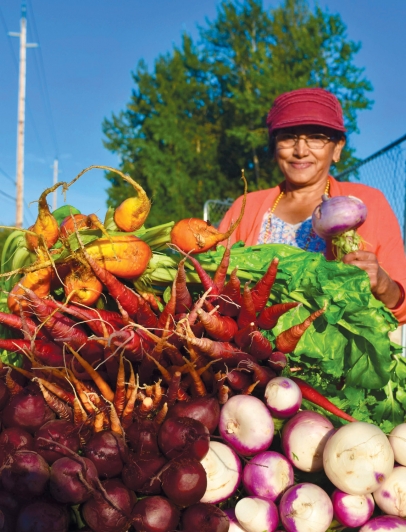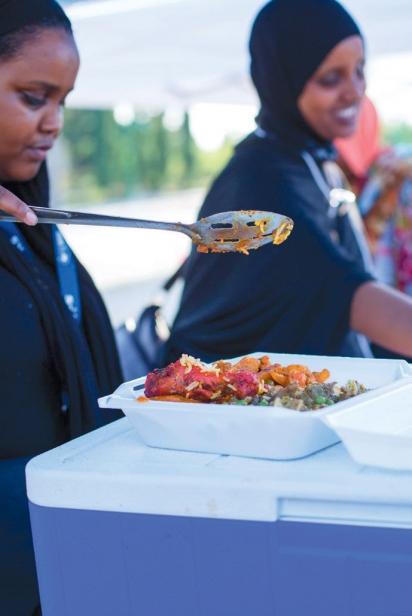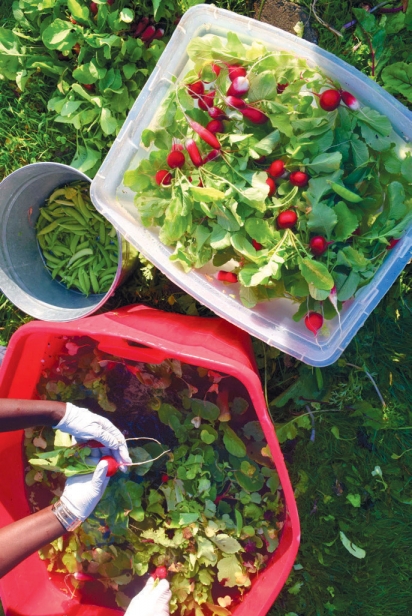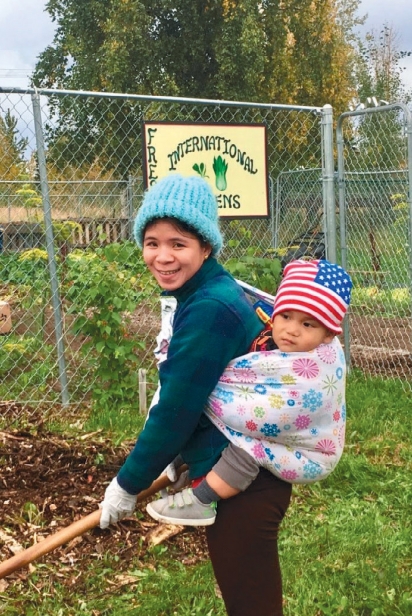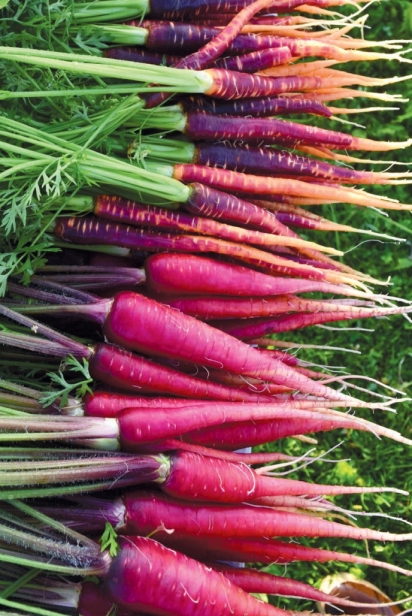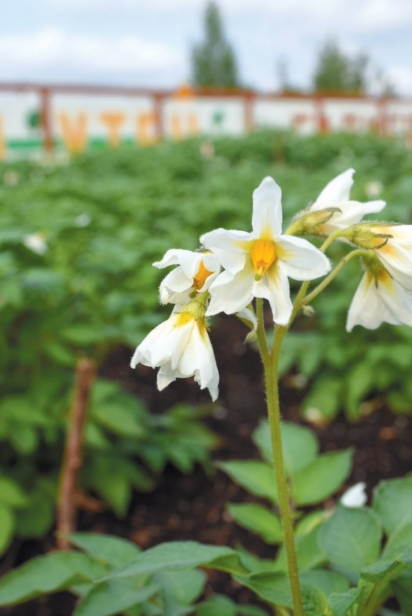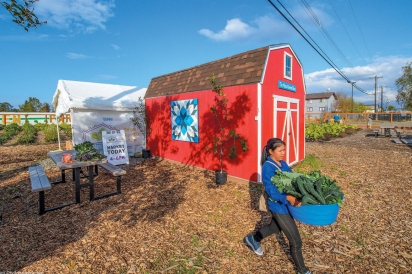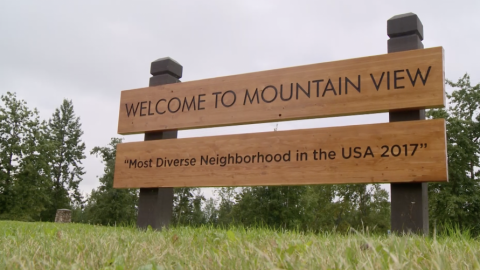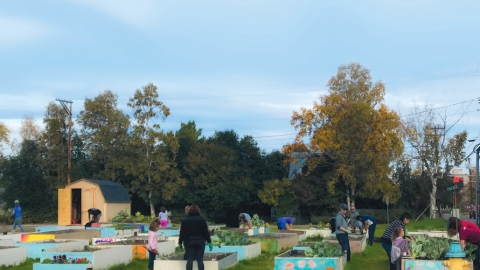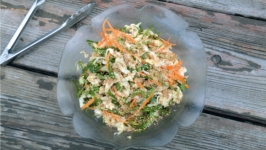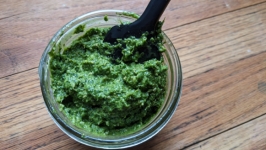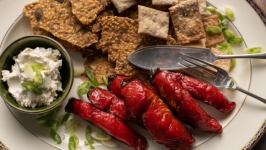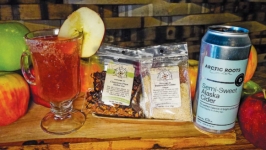Growing into the Neighborhood
Transplant:
1: to lift and reset (a plant) in another soil or situation
2: to remove from one place or context and settle or introduce elsewhere
On a gray, windy day this past November, I pulled up to a nondescript building just off Bragaw Street in Anchorage. Walking past brown grass and shivering hedges, I found it funny that I was here to talk gardening of all things (in the colder months, no matter how long you’ve lived here, the green season seems impossible, like a dream). Yet in true Alaskan form of quick change and extremes, the minute I opened the metal door the atmosphere immediately shifted to warmth, brightness, color, and life as a medley of accents and languages echoed off cinder block walls.
An English class had just ended at the Catholic Social Services Refugee Assistance & Immigration Services Welcome Center. This facility serves as the central meeting place, training hub, and main kitchen space for a unique group of transplants from all over the globe, some aspiring to agricultural and culinary entrepreneurship through the new and buzz-worthy Grow North Farm, which wowed visitors in its debut season last spring and summer. Where Grow North fits within the context of Mountain View’s (and greater Anchorage’s) past, present, and future, and how this all braids together with the experience of being a refugee resettling in Alaska, add up to something truly extraordinary. The farm is helping to plant a whole new view of Mountain View in hearts and minds of Anchorage, including those who are driving that change and thriving there.
Mountain View, one of Anchorage’s first neighborhoods, has a storied history. Early on, its location on the northern tip of the city made it well-suited for both homesteaders and a more transient population of military, railroad, and construction workers. Following a period of rapid development in the 1950s and ’60s, the area gradually fell into an almost 25-year period of decline, contributing to what Emily Cohn, spokesperson for the Anchorage Community Land Trust, describes as its “geographical and economical segregation” from the rest of the city.
Even though crime, poverty, and unemployment rates in Mountain View have steadily fallen in recent years and the neighborhood is continually attracting more successful businesses and long-term residents, a stigma still seems to pervade. “The negative associations that many people have with this area are something we are definitely still having to regularly combat,” Cohn says.
Today, Grow North Farm is front and center on Mountain View Drive, notable by the moose-proof fencing, the small sheds and greenhouses, and the giant “MOUNTAINVIEW” mural that stretches the entire width of a wall on the garden’s back border. Last summer, the beautiful plot of doodo (a Congolese amaranth varietal) laid out in a large spiral that symbolized joy and celebration couldn’t be missed.
The farm is a 28,000-square-foot plot of top-notch urban gardening goodness that sat vacant as a contaminated and abandoned RV park for years. A major clean-up effort transformed it into Mountain View’s first farmers market in 2016. Three years later, the space is so much more than another summer veggie venue, and more complex than another simple volunteer-run or rent-a-plot community garden.
It is also not simply an attempt to slap an attractive façade onto what has been sometimes dubbed a “troubled” or “rough” part of town. The farm sprouted up gradually and organically (all puns fully intended) from the effort and expressed desires of those who live in Mountain View, with the support of two organizations that have been present and active in the area for years.
RAIS (pronounced “rays”), the Refugee Assistance & Immigration Services arm of Anchorage’s largest and longest-serving, nongovernmental social services organization, Catholic Social Services (CSS), is one-half of this partnership. RAIS has assisted anywhere from 50–150 refugees in resettlement annually since Alaska began formally accepting refugees in the late 1990s. The majority of their refugee clients in Anchorage are relocated to Mountain View when they arrive, and many come from places where growing one’s own produce is part of everyday life. Early on, RAIS designated a garden space and training program, Fresh International Gardens, or FIG, to help their clients utilize, develop, and adapt their knowledge and skills, and aid in their overall wellness during resettlement.
As FIG growers graduate out of the training program, they face a variety of obstacles. Most of the growers are women, and many have small children. They arrive with few resources or transportation, and they work to develop language, entrepreneurial knowledge, and skills in a new environment. Many have full or part-time jobs or are seeking employment, which compounds their challenges, especially in regards to their ability to participate independently in many of the local farmers markets.
In this context, this hyper-local, larger-scale urban farm provides the community ample benefits: a space to grow, sell, and buy healthy, quality produce near home; an opportunity to regularly practice ag, business, and language skills; a beautiful event space that could encourage a greater sense of community and attract visitors to Mountain View; and increased opportunities for interaction within an environment rich in cultural diversity. “I think many people don’t understand all the gifts Mountain View has to offer,” says Keenan Plate, head of the ag program at RAIS. “We’re seeing the farm slowly change that.”
Sourcing the space and resources needed to realize these goals is where the other half of this partnership comes in. The Anchorage Community Land Trust (ACLT) is a homegrown, one-of-a-kind community development organization, and one of only a few commercial land trusts in the U.S. One of their primary objectives is to acquire underutilized properties in low-income areas (specifically Mountain View at the moment) and help provide opportunity for much needed business growth and services within that community and beyond. “For us, it’s our mission to help facilitate this exact kind of community-driven effort,” Cohn says. “This was not a top-down initiative; these were needs explicitly expressed to us by the Mountain View community, who were looking for the tools needed for them to make real improvement in their lives and within the community. We think that makes a big difference and helps explain the level of success in this project so far and just the huge amount of support we’ve received from across the community.”
Indeed, support and local drive behind this mission have been nothing short of remarkable. Mountain View saw the current garden space go from a big pile of dirt early last May to a fully functioning farm equipped with irrigation in a matter of weeks. From produce sales alone, the farm generated $18,000 for the farmers, five of whom were managing their own businesses for the first time. The farm’s first season saw thousands of visitors, including volunteers who came from Mountain View, area high schools, the University of Alaska Anchorage, the Joint Base Elmendorf-Richardson, the Alaska Military Youth Academy, The Alaska Center, AmeriCorps, and more. Donations from corporations, small businesses, and many individual donors poured in and have gone to infrastructure like a cold storage unit which should be operational this next season. “One person donated $1,000 on the spot at an event this past summer,” Plate says. “None of what you see here would have been possible without public support. It has really surprised us.”
Support also showed up in the areas of equipment use, transportation, and a volunteer task force that helped with infrastructure planning. Spenard Roadhouse even bought produce at market value and promoted Grow North Farm on their menu. “Things like that were such a good experience for the farmers… just having to consider the business end of those transactions.”
Overall, Plate says they were overwhelmed with the farm’s success on so many different levels. “People would bring their kids, farmers would bring their kids, and it was just a really positive, educational kind of thing. We had no idea what to expect from the soil, whether there would be many people coming, how the farmers would do… It was an overwhelming success, but it was also a lot of just hard work on top of the community support.” Nick Bachman of ACLT agrees: “A lot of people put a lot of love and energy into this project the first year. I can’t wait to see what we can do together at the farm in 2020.”
Plate and Bachman ran the day to day operations and strategy, and assisted over 20 farmers on site, while fulfilling other duties (Plate still oversees FIG, teaches various classes and workshops, manages wellness programs and grant tracking and development of RAIS, and Bachman is ACLT’s AmeriCorps VISTA volunteer who also assists with ACLT’s Sept Up Shop program for entrepreneurs). Despite being responsible for much of the farm’s success, they are always quick to bring attention back to the farmers and their hard work and dedication. The Grow North Farm stand was advertised as open three days a week, but many farmers were in their gardens working and available to sell to visitors nearly every day on their own. Monthly markets provided live entertainment, food and craft vendors, and guided tours of the farm space. Farmers even supply and sometimes host pop-up restaurants where RAIS or ACLT client entrepreneurs use farm-to-table produce to showcase some of their favorite dishes from their home countries.
It’s worthwhile to emphasize that these are not hobby garden plots that are set up for the refugees. While the farmers may each have different primary objectives—some have future business and agricultural aspirations, others are wanting to spend more time outside with their kids, simply connect more to their new environment and community, or practice English with other language learners in a low-pressure environment—every one of them runs a business.
While working their farms, the farmers are able to participate in workshops put on by RAIS and ACLT on topics including goal setting, record keeping, succession planting, and getting hot food permits. Like any new business owners, the farmers are also learning through simple trial and error. “The priority wasn’t a big income, or for the farmers to establish an ag empire here. We weren’t here to make it all run perfectly smooth for them,” Plate says. “It was a chance to learn from experience… For example, what do you do when you have too many radishes in May? What do you need to adjust? Are there herbs or veggies from your home country that you want to try and market here? We can help them do all of that, but the decisions were ultimately theirs.”
Come check out Grow North Farm this summer and prepare to be surprised and delighted by the beautiful veggies and that infectious spirit of collective effort and goodwill that sustains us as a community year-round.
Stop by this spring and follow Grow North Farm via the Anchorage Community Land Trust on Facebook and Instagram to get the heads up on this year’s schedule and events! Markets are held monthly on the second Friday of each month from May through September, and the farm stands are open daily.
In its first season, Grow North Farm’s biggest sellers were salad mix, snap peas, carrots, and radishes.
Nine different languages were spoken on-site: Dinka, Somali Arabic, Nepali, Spanish, Swahili, Kinyarwanda, Burmese, English, and French.


